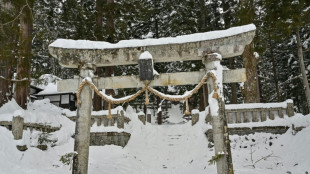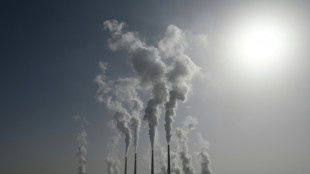-
 Japan warns of avalanches, icy roads ahead of more snow
Japan warns of avalanches, icy roads ahead of more snow
-
All Black Caleb Clarke admits dangerous driving: NZ media

-
 Debutants San Diego stun Galaxy with win in Los Angeles
Debutants San Diego stun Galaxy with win in Los Angeles
-
India's Modi uses mega Hindu festival to burnish credentials

-
 Surprise rebel alliance could give Sudan's beleaguered RSF a boost
Surprise rebel alliance could give Sudan's beleaguered RSF a boost
-
Three years after Russia invasion, UN faces difficult votes on Ukraine

-
 German 'rust belt' town spotlights growing appeal of the far right
German 'rust belt' town spotlights growing appeal of the far right
-
Campbell downs Potgieter in playoff for first PGA Tour title in Mexico

-
 USA and Japan win to set up SheBelieves Cup decider
USA and Japan win to set up SheBelieves Cup decider
-
Most USAID workers to be fired or placed on leave

-
 Hakimi scores twice as PSG sink Lyon to stay unbeaten in Ligue 1
Hakimi scores twice as PSG sink Lyon to stay unbeaten in Ligue 1
-
Hat trick pulls Ovechkin closer to Gretzky's NHL goals record

-
 Tanaka strikes again as Japan down Colombia
Tanaka strikes again as Japan down Colombia
-
Baker wins US indoor 60m as Kessler, Hiltz complete double

-
 Kane admits last-minute decision to make Bayern bench
Kane admits last-minute decision to make Bayern bench
-
Bakers wins US indoor 60m as Kessler, Hiltz complete double

-
 American Airlines flight lands in Rome after 'security' issue
American Airlines flight lands in Rome after 'security' issue
-
Dupont eyeing Six Nations showdown with Ireland after Italy rout

-
 Slot wary of Premier League dangers despite 'big' Man City win
Slot wary of Premier League dangers despite 'big' Man City win
-
Borthwick defiant after uninspired England edge Scotland

-
 Nations at odds over major UN climate science report
Nations at odds over major UN climate science report
-
Pakistan fans look away from India Champions Trophy 'humiliation'

-
 Global prayers as Vatican says pope still 'critical'
Global prayers as Vatican says pope still 'critical'
-
Pakistan's Rizwan admits Champions Trophy dream 'ended' by India

-
 France star Dupont eyeing Six Nations showdown with Ireland after Italy destruction
France star Dupont eyeing Six Nations showdown with Ireland after Italy destruction
-
'We need another title', says Salah after 'special' Man City win

-
 Relentless Bayern stay eight points clear
Relentless Bayern stay eight points clear
-
Kohli shuts down 'noise' with landmark century

-
 Modric stunner maintains Real Madrid title charge
Modric stunner maintains Real Madrid title charge
-
Salah-inspired Liverpool beat Man City to open up 11-point Premier League lead

-
 Townsend wants England agony to inspire Scotland for Six Nations finish
Townsend wants England agony to inspire Scotland for Six Nations finish
-
Eleven-try France destroy Italy to set up Six Nations showdown with Ireland

-
 Every game 'pressure' as Bangladesh face make-or-break clash
Every game 'pressure' as Bangladesh face make-or-break clash
-
Conservatives win German vote as far-right makes record gains

-
 Israel ready to resume Gaza war, PM warns after truce delay
Israel ready to resume Gaza war, PM warns after truce delay
-
'Captain America' slips but clings to N. America box office lead

-
 Modric hits rocket as Real Madrid beat Girona
Modric hits rocket as Real Madrid beat Girona
-
Eleven-try France hammer Italy 73-24 in Six Nations

-
 Kohli hits ton as India push Pakistan to brink of Champions Trophy exit
Kohli hits ton as India push Pakistan to brink of Champions Trophy exit
-
Zelensky offers to resign in exchange for Ukrainian NATO membership

-
 US ski star Shiffrin hits 100 to cement legendary status
US ski star Shiffrin hits 100 to cement legendary status
-
Forest felled by Isak as Newcastle bolster top four bid

-
 Man City's Haaland ruled out for Liverpool clash
Man City's Haaland ruled out for Liverpool clash
-
Referee 'corruption' accusations leave Marseille president Longoria facing punishment

-
 Van Persie returns to Feyenoord as coach
Van Persie returns to Feyenoord as coach
-
Athletic Bilbao crush Valladolid to maintain top four pace

-
 Former soccer star Ozil goes into Turkish politics with ruling party
Former soccer star Ozil goes into Turkish politics with ruling party
-
Shiffrin questioned return before claiming historic 100th World Cup win

-
 Angel Yin wins Thailand LPGA tournament by one shot
Angel Yin wins Thailand LPGA tournament by one shot
-
Pogacar wins the UAE Tour with mountain break

No clear favorite as Costa Ricans elect new president
Costa Ricans voted for a new president Sunday from a crowded field of candidates, with no clear favorite to tackle a worsening economy in one of Latin America's stablest democracies.
Twelve hours of voting kicked off at 6:00 am (1200 GMT) in what is frequently rated the region's "happiest" country, a tourist mecca and a leading green economy.
However, polls show unemployment, corruption and creeping living costs topping the concerns of 3.5 million eligible voters in the Central American country of five million people.
Unemployment has been steadily rising for more than a decade and reached 14.4 percent in 2021.
Poverty was at 23 percent last year, and a public debt at 70 percent of GDP has raised flags for multilateral agencies.
Costa Rica's problems have worsened with the Covid-19 pandemic dealing a hard blow to its critical tourism sector.
"Voting is the most important weapon we have to solve problems," said 35-year-old Francisco Zeledon, the first voter in line at his polling station.
"We have to solve poverty and create jobs for people," he said.
Polls showed about a third of voters undecided, faced with a choice from 25 presidential candidates.
But one trend was clear: the ruling Citizens' Action Party (PAC) appeared set for a bruising defeat amid sky-high anti-government sentiment.
Its candidate, former economy minister Welmer Ramos polled at only about 0.3 percent.
- Record unpopularity -
"The ruling party is completely weakened and has no chance" after two successive terms in office, said political analyst Eugenia Aguirre.
"The presidential unpopularity figure of 72 percent is the highest since the number was first recorded in 2013," she added.
This meant the country's traditional political heavyweights -- the centrist National Liberation Party (PLN) and the right-wing Social Christian Unity Party (PUSC) -- could return to the fore after decades of a near political duopoly only recently broken by the PAC.
According to polling, former president Jose Maria Figueres (1994-98) of the PLN was leading with about 17 percent of stated support, followed by the PUSC's Lineth Saborio on about 13 percent.
"This country has a million and a half people living in poverty and half a million in extreme poverty," Figueres said on Sunday.
"There is a housing shortage of 160,000 homes. We have never experienced these things in this magnitude."
Polls showed evangelical Christian singer Fabricio Alvarado Munoz of the right-wing New Republic Party (PNR) in third spot with just over 10 percent.
He commands support from the evangelical community, which makes up about 20 percent of Costa Rica's population.
Fourth-placed was economist Rodrigo Chaves of the newly formed centrist Social Democratic Progress Party with just over eight percent.
The highest-polling left-wing candidate was Jose Maria Villalta of the Broad Front with about 7.6 percent of stated support.
Presidents in Costa Rica cannot seek immediate re-election, leaving incumbent Carlos Alvarado Quesada out of the running.
- Problems have 'worsened' -
Costa Rica is known for its eco-tourism and green policies: its energy grid is entirely run on renewable sources.
Unlike many of its volatile Central American neighbors, Costa Rica has no army, has had no armed conflicts since 1948 and no dictator since 1919.
But the worsening economic situation has hit confidence in the political class.
Voters under 40 have only known "periods in which not only problems have not been resolved, but they have worsened," university student Edgardo Soto, an undecided voter, told AFP.
Apathy and abstentionism are features of Costa Rican elections.
In 2018, 34 percent of voters stayed away, though participation is technically obligatory.
Eugenia Zamora, president of Costa Rica's electoral tribunal, said Sunday's vote kicked off with high turnout in the morning, and proceeded without incident.
"This is a country with a robust democracy... It offers lessons for other countries," added Isabel de Saint Malo, head of the Organization of American States observer mission.
Outgoing president Alvarado, for his part, said Sunday's vote was an affirmation of Costa Rica's place among "the world's strongest democracies."
Costa Ricans also cast their vote Sunday for the 57-member Congress.
Initial results are expected about three hours after polls close at 6.00 pm.
If no single presidential candidate receives 40 percent of the ballots cast, there will be a runoff between the top two on April 3.
"I hope that whoever wins really thinks of the people," said 77-year-old Mayra Sanchez after voting in the canton of Moravia, "and not of themselves."
D.Moore--AMWN